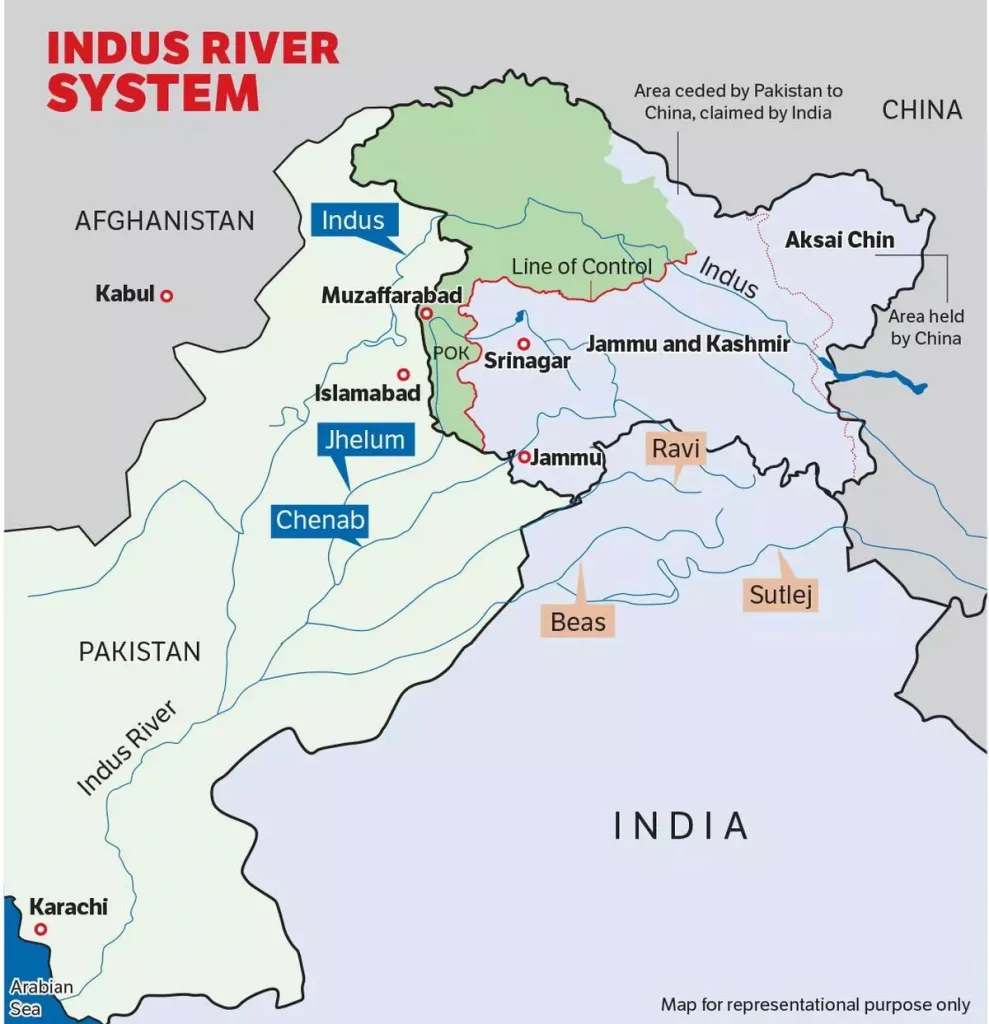Syllabus: GS2/India and Its Neighbourhood
Context
- Recent geopolitical and environmental changes have prompted calls for Indus Waters Treaty (IWT)’s modification and exploring the complexities and challenges involved in renegotiating the IWT, considering the perspectives of both nations.
About the Indus Waters Treaty (IWT)
- It is a landmark agreement between India and Pakistan, was signed in 1960, brokered by the World Bank, to manage and share the waters of the Indus River system.
- It has been a cornerstone of cooperation and conflict resolution between the two nations, despite their often strained relations.
Historical Context
- The partition of British India in 1947 not only divided the land but also the Indus River system, which flows through both countries.
- The initial agreement, the Inter-Dominion Accord of 1948, failed to provide a lasting solution, leading to disputes over water sharing.
- The World Bank’s intervention in 1951 eventually led to the signing of the IWT by Indian Prime Minister Jawaharlal Nehru and Pakistani President Ayub Khan in 1960.
Key Provisions
- The treaty allocates the waters of the six rivers of the Indus basin between the two countries:
- Eastern Rivers (Ravi, Beas, Sutlej): Allocated to India for unrestricted use.
- Western Rivers (Indus, Jhelum, Chenab): Allocated to Pakistan, with India allowed limited use for agriculture, domestic purposes, and non-consumptive uses like hydropower generation.

Mechanisms for Cooperation
- The IWT established the Permanent Indus Commission (PIC), comprising commissioners from both countries, to manage the treaty’s implementation and resolve disputes.
- The PIC meets regularly to discuss issues and ensure compliance.
India’s Perspective
- India’s recent move to seek modifications to the IWT is driven by several factors.
- The demographic and agricultural demands have significantly increased since 1960. India argues that the treaty needs to reflect these changes to ensure sustainable water management.
- Additionally, India is keen on accelerating its hydropower projects on the western rivers, which are permitted under the treaty but have faced objections from Pakistan.
Pakistan’s Concerns
- Pakistan, as the lower riparian state, is primarily concerned with ensuring uninterrupted water flow. The country relies heavily on the Indus River system for its agriculture and drinking water.
- Pakistan fears that India’s proposed modifications could reduce water availability, impacting its agricultural output and overall water security.
Current Challenges
- Hydropower Projects: India’s construction of hydropower projects on the western rivers has been a point of contention. Pakistan fears these projects could affect water flow, while India insists they are within the treaty’s provisions.
- Technical Disputes: One of the primary issues plaguing the IWT today is the technical dispute over the interpretation of its provisions.
- Both countries have different understandings of how the treaty should be implemented, particularly concerning the construction of hydroelectric projects by India on the western rivers.
- Pakistan fears that these projects could reduce the flow of water into its territory, while India insists that they are within the treaty’s guidelines.
- Political Tensions: The bilateral relationship between India and Pakistan is currently at a low point, with minimal diplomatic or economic engagement.
- This strained relationship exacerbates the difficulties in resolving technical disputes and finding common ground on water-sharing issues.
- Climate Change: The impacts of climate change, including altered precipitation patterns and glacial melt, are adding another layer of complexity to the management of the Indus Basin.
- These changes threaten the long-term sustainability of the water resources that the treaty was designed to manage.
Renegotiations: Modifying the Indus Waters Treaty
- In recent years, India has sought to modify the treaty to address its growing water needs and concerns over cross-border terrorism affecting treaty operations.
- However, renegotiating the treaty remains a complex and sensitive issue, given the lack of trust between the two nations.
Arguments for Modifying the Treaty
- Adaptation to Modern Challenges: The treaty may not fully address contemporary issues such as climate change, increased water demand, and new technological advancements.
- Updating the treaty could help both countries manage their water resources more effectively in the face of these challenges.
- Securing Water Interests: For India, modifying the treaty could provide an opportunity to secure its water interests more robustly, particularly in light of its growing population and agricultural needs.
- It could involve clearer guidelines on the construction of hydroelectric projects and better mechanisms for dispute resolution.
Risks of Modifying the Treaty
- Escalation of Tensions: Any attempt to modify the treaty could be perceived as a unilateral move by Pakistan, potentially escalating tensions.
- Given the already strained relations, this could lead to further diplomatic and possibly military confrontations.
- Political Sensitivities: Water is a highly sensitive issue in both countries, and any changes to the treaty could be met with significant political resistance domestically.
- It could complicate negotiations and make it difficult to reach a mutually acceptable agreement.
Way Forward: Balancing Act
- To navigate these challenges, a balanced approach is necessary. Engaging in dialogue with Pakistan, possibly with the involvement of neutral third parties like the World Bank, could help in finding common ground.
- Both countries need to recognize the mutual benefits of cooperation over conflict when it comes to shared water resources.
- Ultimately, while modifying the IWT could help address modern challenges and secure India’s water interests, it must be approached with caution to avoid exacerbating tensions.
- Constructive dialogue and a willingness to compromise will be key to any successful renegotiation.
| Daily Mains Practice Question [Q] Given the ongoing tensions between India and Pakistan, do you believe that modifying the Indus Waters Treaty is a necessary step to secure India’s water interests, or could it further escalate tensions between the two countries? |
Previous article
Trump 2.0: A New Era For India-US Relations